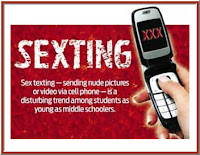 12-16-2009 Virginia:
12-16-2009 Virginia:
RICHMOND, Va. -- Members of the Virginia State Crime Commission refused Tuesday to recommend legislation concerning sexting, but the issue is likely to come before lawmakers next month.
Currently, it's up to commonwealth's attorneys whether to charge teens and young adults who send sexually explicit pictures or videos through text messages or e-mails with possessing or transmitting child pornography. Several have done so, and some lawmakers say there should be laws to ensure the issue is dealt with uniformly across the state.
But others, like Del. David Albo, R-Fairfax, said taking the discretion away from the state's 120 elected prosecutors could result in a teen being punished for a stupid mistake while allowing a serious predator to receive a mere slap on the wrist. Albo called possible legislation "a total minefield."
"We are dancing on very, very scary territory here if you're talking about changing the law," he said.
As in other states, Virginia lawmakers are torn between deterring children and teens from sending naughty pictures of themselves or others and dolling out harsh punishments for what is often a voluntary act between hormone-crazed teens.
A recent Associated Press-MTV poll found that more than a quarter of young people have been involved in some sort of sexting. In the survey of 1,247 teenagers and adults ages 14-24 conducted Sept. 11-22, 10 percent said they had sent naked pictures of themselves on their cell phone or online. Seventeen percent of those who received naked pictures said they passed them along to someone else, often to more than one person.
This year, lawmakers in at least 11 states introduced legislation aimed at sexting. Six states passed laws, according to the National Conference of State Legislatures.
Crime Commission staff offered three options: leave the law unchanged, with prosecutors determining whether to press charges; make sexting a misdemeanor; or exempt juvenile sexting from child pornography laws.
Currently, those found guilty of possessing or distributing child pornography could face up to 30 years in prison, although that's not likely in sexting cases. If older than 13, they could end up on the sex offender registry list.
Mary Devoy, of Reform Sex Offender Laws of Virginia, warned that requiring young people convicted of sexting to register as sex offenders undermines the sex offender registry.
"Today's sexting is what the 1970s and '80s was with Polaroid cameras," she said. "Yes, the world wide web has changed the permanence of these photos and videos, but the stigma of sex offender for a lifetime is too extreme of a punishment for a stupid teenage mistake." She advocated for a new law so that prosecutors wouldn't have such broad discretion.
While the commission is made up of several legislators, it only studies and recommends legislation. Lawmakers are not bound by its actions.
Robie Ingram, a staff attorney with the division of legislative services, said two legislators have asked that bills concerning sexting be drafted for the 2010 General Assembly session, which begins Jan. 13. Those bills are confidential.
The crime commission's refusal to endorse legislation could persuade the lawmakers to hold off on filing the bills.
Sen. Janet Howell, D-Fairfax County, said time would be better spent educating young people about the possible repercussions than prosecuting them. She plans to write a letter to the state Department of Education asking that it inform students and parents about the dangers of sexting.
"A very large percentage of the young people in the country don't understand the seriousness of what they're doing or the ramifications," she said. "We should have the school systems putting out information and not locking up" students. ..Source..
December 16, 2009
Va. panel refuses to recommend legislation regarding 'sexting'
Subscribe to:
Post Comments (Atom)

No comments:
Post a Comment